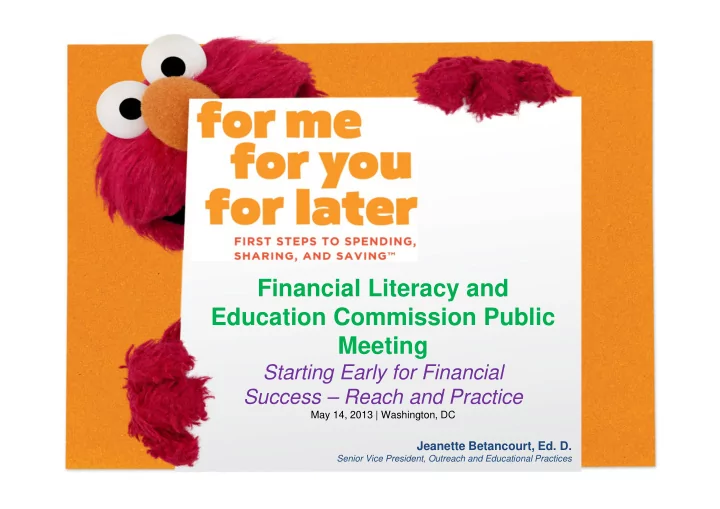

Financial Literacy and Education Commission Public Meeting Starting Early for Financial Success – Reach and Practice May 14, 2013 | Washington, DC Jeanette Betancourt, Ed. D. Senior Vice President, Outreach and Educational Practices
Sesame Workshop PNC Grow Up Great is a uses the educational $350 million, multi-year initiative begun in 2004 to power of media to help prepare children from birth all children reach their to age five for success in highest potential. school and life. 2
WHY FINANCIAL EDUCATION AND EARLY CHILDHOOD? Research indicates: • Young adults display lower financial literacy knowledge than older generations • There are opportunities to engage young children in financial education in ways that integrate the whole family • Limited bilingual (English/Spanish) resources supporting everyday moments and financial education for young children FINRA Investor Education Foundation. (2009). 2009 National Financial Capability Study . Retrieved from http://www.finrafoundation.org/resources/research/p120478. Kiviat, B. “How to Teach Kids About Money.” Time . Monday, January 25, 2010. Retrieved from http://www.time.com/time/magazine/article/0,9171,1953695-1,00.html. 3 Holden, K., Kalish, C., Scheinholtz, L., Dietrich, D., Novak, B. (2009). Financial Literacy Programs Targeted on Pre-School Children . Retrieved from minds.wisconsin.edu/handle/1793/36314.
WHAT DID OUR FORMATIVE RESEARCH REVEAL? Parents Grandparents • Felt extremely uncertain of their • Felt their own children needed own financial education financial education even more knowledge than their grandchildren • Limited communication between • Expressed guilt in not doing a caregivers on financial better job responsibility • Did not understand how to incorporate money concepts with young children Early childhood educators • Felt extremely uncomfortable about financial education in a classroom • Could not consider ways to integrate into themes or daily classroom routines • Unaware of how to communicate financial education activities to families 4
INTEGRATING FINANCIAL EDUCATION INTO EVERY DAY MOMENTS Choices: Everyday choices link to financial choices • Selecting between what shoes to wear in the morning – blue or brown? • Selecting between an expensive toy versus a less expensive one • There are needs and wants – needs can be food or shelter while wants can be fun activities or an expensive toy Value: Develop a better understanding of the value of people and things • Value of a favorite stuffed animal • Things that are bought have a value (cost) • People are valued for contributing to their family and community Spending, saving, and sharing • Three jar concept 5
THE INITIATIVE AND RESOURCES ACROSS MEDIA PLATFORMS DVD Audio Podcast Online Game Free bilingual resources available at 6 sesamestreet.org/save and pncgrowupgreat.com
FACILITATING INTEGRATION INTO A VARIETY OF SETTINGS Integrated within: • Community events • Early childhood programs • Libraries • Play groups • Parenting workshops • Other activities Utilized the PNC Grow Up Great volunteer network • Choices during everyday activities People in the community (value) • • Children’s Activities • Spending (visit to the grocery store), • Family Workshops sharing (sharing items in class), saving • Community Events (a classroom saving jar) • Family Newsletters 7
IMPACT RESEARCH OUTCOMES Families: Educators: • Significantly reduced • Significant increase in stress on introducing willingness and financial education as a understanding of how to family activity introduce financial education • Increased strategies to • Integrated Sesame Street introduce and use the financial education content basics of financial into classroom activities education with their • Increased educator’s own children financial awareness and • Repeatedly used practices resources • Desire for technical • Increased the family assistance members’ own focus on financial awareness and practices 8 Fluent Research. (2012) . For Me, For You, For Later Impact Assessment Report . New York, NY.
9
Recommend
More recommend